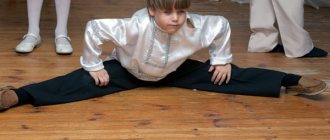Why do we need a psychological and pedagogical characteristic for a student?
The psychological and pedagogical characteristics of the student are written with maximum consideration of the individual aspects of the development of each child, describing in detail his psychological characteristics. This is explained by the fact that it plays a very important role in the educational process, significantly simplifying the interaction of the school’s teaching staff with the student. Allows the teacher to get an initial idea of the student and choose the most beneficial strategy for interacting with him.
In addition, such characteristics may be required when transferring to another school or college; they are requested by the guardianship authorities, the police and the PDN, and the military registration and enlistment office.
Rules for conducting psychological and pedagogical examination
There are fairly clear rules for drawing up a student’s characteristics. One of the fundamental requirements for conducting psychological and pedagogical characterization is objectivity . It is equally important to carefully analyze the factors influencing a child’s development as a whole, taking into account the characteristics of the student. The child should be treated as delicately as possible, minimizing any coercion or pressure on him. Only in this case can a psychological and pedagogical characterization of a student or student be as objective and useful as possible.
The student's characteristics are written by the class teacher and signed by the school director. When writing a psychological profile of a child, you may need the help of a school psychologist, testing and diagnostic results.
Personality structure
Personality is a complex whole. At the same time, the structure of the personality stands out in this complex whole. These are three main blocks:
- personality orientation, that is, a system of relationships to the surrounding world, which includes needs, interests, motives of behavior, ideals, beliefs, inclinations, worldview;
- personal capabilities, so-called abilities and inclinations;
- psychological characteristics of behavior, including temperament and character.
How to write a reference for a student
Let's consider what a typical psychological and pedagogical profile drawn up for a secondary school student should look like. The content of the characteristic may depend on the person who requires it. The minimum volume of the characteristic is 800-900 characters, the maximum volume is not limited, and, as we said above, the characteristic can contain reports on work with the student, test results.
- At the beginning, indicate the student’s last name, first name and patronymic, the class in which he is studying, and the characteristics of his health group.
- If desired, you can also indicate the most striking external features. This data can be obtained by organizing a conversation with both the student himself and his parents.
- It is equally important to indicate the composition of the student’s family, features of social status, and the quality of interaction.
- After this, you can move on to studying the child’s personal characteristics, covering his attitude to school (hard work, perseverance, academic performance) and to others (development of communicative competencies, ability to communicate with peers and with adults). Data can be obtained both through observation and conversation with the child, and through projective techniques (drawing tests, etc.).
- The psychological and pedagogical characteristics of a student should contain information about his resistance to stress, level of development of thinking and speech, emotionality, attention, and punctuality.
- It is necessary to indicate how high the child’s social status is and whether he easily establishes social contacts.
- At the end of compiling the characteristics, you need to summarize the development of the student and the correspondence of his level to age characteristics. Recommendations related to upbringing, training and further interaction with the child are given.
The characteristics that will be transferred to a third-party organization are written on school letterhead, with the date and signature of the person who prepared it and the signature of the school director at the bottom.
How does Platonov's method work in psychology?
How to make a psychological portrait of a personality. In this collection we have collected all three types of characteristics, as well as samples, templates and recommendations for writing them. Firstly, it is necessary to understand that the psychological portrait of a criminal is drawn up only when, it would seem. At this point I’ll probably finish drawing up my psychological portrait and be done.
To the question of what personality is, different experts answer differently. It is in the diversity of their answers, and, consequently, in the divergence of opinions on this matter that the complexity of the personality phenomenon itself is revealed.
How to draw up a psychological portrait of a personality - this question interests many people engaged in self-knowledge and seeking to know the characteristics of those people who are nearby. To create a comprehensive psychological portrait of a personality, you need to examine the following criteria:
- temperament;
- capabilities;
- direction;
- character;
- strong-willed qualities;
- locus of control;
- self-esteem;
- intelligence;
- emotions;
- ability to communicate.
Observing other people, how they work, study, communicate, experience joy and sorrow, we undoubtedly pay attention to the differences in their behavior.
At the same time, those qualities that are not welcomed by parents also develop. So, by the age of six, almost all children can lie. Children may develop “aggressive fantasies.” A child may say: “Mom, you are bad, I don’t love you.”
Alexander takes his work seriously and thoroughly, and is inclined to do all the work from start to finish himself, not trusting others. After the work is completed, it is important for him to find out the opinions of others about what was done. We can say that Alexander needs others to recognize the value of what he has done.
This result is quite consistent with Valentin’s external manifestations; I completely agree that his temperament type is dominated by phlegmatic traits.
He has adequate self-esteem, this is expressed in a feeling of self-confidence, the presence of self-determination, an inner core. In behavior, this is manifested in activity, the desire to expand the field of one’s activities, and the absence of fear of failure. He is not afraid to take risky steps and take initiative. He is quite independent in his views and desires.
Abilities are understood as individually stable properties of a person that determine his success in various activities. Temperament includes qualities that influence a person's reactions to other people and social circumstances. Character contains qualities that determine a person’s actions towards other people.
Using various techniques, you can create a psychological portrait of a person’s personality without even knowing him. Such personality portraits are often used when hiring, even in marriage agencies to select a couple.
Does not care at all about keeping his things in proper order, he is always unkempt and sloppy. On occasion, he does not hesitate to damage public property.
Sample characteristics for a student
You can view ready-made characteristics for a student on our website - select a sample characteristics below. The development will help the class teacher quickly and efficiently draw up a character reference for a student. You can create a complete description according to the plan on this page.
Sample pedagogical characteristics for a primary school student
Sample characteristics for a primary school student from a teacher, required when passing a psychological and pedagogical commission at any level. The characteristics are written in two copies, signed by the teacher and the director, and the school seal is required.
Up
Psychological and pedagogical characteristics surname first name.
Full Name:
Date of Birth:
Father:
Mother:
Residence address: ………………….telephone….
School No. class
He has been studying at school No. since one year (retained for a repeat course in the class);
studied at school no.
Psychological characteristics of cognitive processes
General motor skills are characterized by (in)sufficient voluntary control of movements, fine motor skills are well/weakly developed.
The perceptual function is not sufficiently developed, the child (not) experiences minor difficulties when acting according to a visual model/verbal instructions. Perception is better/worse developed than thinking.
Attention is (un)sustainable and (un)exhaustible, voluntariness, concentration and switchability are reduced/within the age norm.
Visual memory, short-term and long-term, is (not) sufficiently developed. Voluntary short-term memory is (not) high. Medium/high/low level of mechanical memory, level of logical memory lower/higher. When memorizing, he quickly gets tired/memorizes (small) large/medium amounts of text.
Visual-effective and visual-figurative thinking are better/worse developed than verbal-logical thinking/correspond to the norm for a given age.
(not) Disorders of oral speech development and phonemic hearing are detected. Articulation (“blurred”/pronunciation of sounds in syllables and words is unclear/agrammaticalisms are frequent/inconsistency).
The level of conceptual development and orientation in the surrounding world is (in)sufficient/appropriate for age.
In general, the child is characterized by (increased fatigue/unstable attention/predominance of inhibition processes over excitation processes).
Pedagogical characteristics of educational activities.
The child is studying in a mass class/is receiving individual instruction… for a year.
Literary reading. Reading rate ... words per minute (norm at the end of the first/second half of the year ... words). Reading (not) sufficiently conscious, but little expressive/not expressive/expressive), without/with observance of logical pauses and intonation at the end of the sentence. Makes many mistakes (the nature of the mistakes), (but does not) repeat them when re-reading the text. A detailed/brief/creative retelling of the text is difficult, omits details, descriptions, the story is little/quite emotional. He reads poems by heart with errors, (not) expressively enough. Gives complete/expanded/monosyllabic answers to questions, makes (minor) mistakes when establishing cause-and-effect relationships. Vocabulary is limited/age appropriate.
In the Russian language, he (doesn’t) know the rules well and (doesn’t) understand/doesn’t always understand how to apply them. Grapho-motor skills are (not) sufficiently developed, handwriting is different (careless/often very small/very large/uneven, (not) legible). The following errors appear in writing: (omissions and substitutions of letters (often similar in spelling or denoting similar sounds), unnecessary elements of letters, as well as their underwriting, agrammatism), which indicates a violation of the writing processes.
In mathematics, difficulties are caused by the development (graphical skills, counting skills, problem solving). Mathematical speech is (not) formed slowly/in full. The greatest difficulties are caused by (the formation of computational skills, which are at a low/medium level (counts within 10 without relying on clarity); mechanical memorization of the multiplication/addition tables is more successful). The specific meaning of the operations of multiplication and division/addition and subtraction is realized only when visualization is used. When solving problems, difficulties arise (explaining the choice of action, writing down explanations, omitting names).
Completes homework (not) in full, but under the control of parents/independently.
The pace of work in the lesson is (in)sufficient/low/medium/high when performing simple (of the same type) tasks independently/collectively; exercises that require switching attention (do not) cause a decrease in pace. The child is not very active in lessons, and creative tasks (do not) arouse interest.
There is no/low educational motivation. Self-control is poorly developed/within the age norm/highly developed; independent work skills are (in)sufficiently developed/developed with difficulty.
Relations with the teacher /calm/smooth/friendly; fulfills demands and instructions formally/willingly/sometimes reluctantly/with desire. He often reacts with restraint/(in)adequacy to comments and praise.
The child’s clothes are (un)tidy, writing materials and school items are in good/(un)satisfactory condition.
The child is (little) sociable, is (un)friendly with other children, (does not) participate in group games/is often a leader. There are/are no friends outside of school, hobbies(…), at school he participates in clubs(…), he attends outside school(…).
Parents comply with the teacher’s recommendations and requests (to the extent possible)/do not fulfill them.
Teacher______________/acting surname /
Director ____________/acting surname /
Up
Characteristics of a difficult student
The characterization of a difficult student requires a special approach from the teacher who composes it. Not only psychological knowledge, but also the ability to analyze the situation from different angles, revealing the main reasons for his low performance or difficult to educate. The social environment has a great influence on this:
- family influence (parents having addictions, criminal records, single-parent and large families, violence and conflicts in the family);
- low material well-being in the family;
- the presence of seriously ill close relatives who are in direct contact with the child;
- difficult life circumstances
An example of a characteristic for a difficult student
Up
Characteristics of a student in the __ class of the MBOU __________________ Secondary School
____________________, __.__._____ the year of birth,
residing at: _________________________
Ivan Ivanov has been studying at the Municipal Budgetary Educational Institution ________________ since __ grade. He has been on the school register since 2nd grade for violations of discipline. He was registered with the Commission on Minors' Affairs and Protection of Their Rights under the administration of the ________ district in 2016-2017 for causing harm to the health of a student at the _____________ school.
Composition of Ivan Ivanov’s family: mother – __________________ and father ____________________. The parents are currently living separately. Ivan lives with his mother in a rented apartment.
____________________'s mother works ________________ in _______________. The father does not participate in upbringing, does not help the family financially, and abuses alcohol.
Mother ____________________ answers the class teacher's calls, always comes to school at the invitation of the class teacher, teachers, and deputy directors, but does not always attend parent-teacher meetings. The mother overprotects Ivan, tries to satisfy all his needs and protects him from worries and efforts, and does not control Ivan’s academic work and behavior enough.
Ivan is outwardly neat, well dressed, has all the necessary school supplies and textbooks provided to him for use by the school.
Ivan's intellectual capabilities are low. The attitude towards studying is negative. He was conditionally transferred to the 6th grade with academic debt in mathematics. At the end of the 1st and 2nd quarters of the 2015-2016 academic year, he had unsatisfactory grades in 6-9 subjects. Rarely does homework. He often reacts inadequately to teachers’ comments. In many lessons, he refuses to get a textbook, notebook, diary, or complete school assignments.
Conflictful, hot-tempered, unbalanced. Has high self-esteem. During the last two years of study, he committed numerous violations of discipline in lessons and outside of class hours, and was rude to his classmates. There was an obscene statement in a mathematics lesson, obscene language addressed to classmates.
Avoids participation in school-wide events. Performs public assignments under pressure. Treats public property with disrespect.
Shows interest in physical education, engages in weightlifting at the physical education and health center in +______. E
Preventive conversations were held with Ivan Ivanov many times by the class teacher, members of the Prevention Council and the school administration. Preventive work was carried out with the student’s mother, who was repeatedly invited to conversations with the class teacher and the school administration on the issue of her son’s low academic performance, but there were no changes for the better. During the 2014-2015, 2015-2016 academic year, it was considered at meetings of the small teaching council, pedagogical council, and the Prevention Council for poor academic performance and violations of discipline. Individual conversations were held with his mother and Ivan on numerous occasions regarding complaints about Ivan’s rough treatment of his classmates. The mother was recommended to strengthen control over Ivan’s academic performance and behavior. Mom listens to the comments of the class teacher, teachers, and deputy principals, but believes that the teachers do not pay enough attention to Ivan’s training and upbringing. ____________'s mother explains her rude treatment of classmates and other school students by saying that the children themselves provoke Ivan. Due to the fact that Ivan’s behavior in the classroom reduces the effectiveness of the teachers’ work, members of the class parents’ committee asked the school administration to take corrective action against Ivan Ivanov.
During the 2014-2015, 2015-2016 school year, the class teacher and deputy director for VR held conversations with Ivan about the inadmissibility of rude treatment of school students and the prohibition of fights.
He was not found guilty of vagrancy, theft, or consumption of alcohol or substances at school.
Director of MBOU _________________
Classroom teacher _________________
Up
Psychological presentation of an 8th grade student
The girl is calm, reasonable, easily establishes contacts, and is interested in the results of her activities. Maintains social distance. Focused on formal compliance with social norms.
Can independently navigate a learning task, build a hypothesis, predict a result, choose a method of action, work in accordance with well-learned instructions, evaluate the results of one’s activities (there is a tendency to overestimate). For a girl, the formal side of assessing her success is more important.
Cognitive interests are formed and cover subjects of the humanities and natural sciences.
Features of the development of sensory systems:
- the leading system of perception is auditory, lower - visual;
- concentration of attention at an average level;
- stability and distribution of attention according to a number of characteristics - at an average level;
- The volume of visual and auditory-verbal memory corresponds to the age norm.
The speech sphere is without features.
Type of nervous system - medium: potentially capable of withstanding long-term stress during monotonous activity. It takes considerable time to get into the task, after which the most productive period of activity begins, corresponding to the middle and second half of the lesson. The pace of mental activity is high. Fatigue occurs in the form of satiety.
The emotional sphere is characterized by high situational anxiety due to the desire to meet the “ideal” created by the girl under the influence of the inflated demands of significant adults (parents), and the fear of not meeting expectations.
The external impression of inadequately high self-esteem hides internal dissatisfaction with her real achievements, which is why the girl attaches so much importance to formal signs of success (good grades). The level of claims is too high. Accepted in the peer group.
Recommendations for teachers
When organizing the educational process, you should use the girl’s ability to work independently according to the learned algorithm. When learning new or complex educational material, it should be offered closer to the middle of the lesson or in the second half. If difficulties arise, it is advisable to repeat the most difficult moments orally and/or offer visual supports. If fatigue occurs, the girl is recommended to change the type of activity.
When assessing the results of activities, it should be argued in detail. It is useful to encourage the girl to independently evaluate her results, explaining her point of view. It is necessary to provide the opportunity for self-expression in the most successful activities, encouraging real achievements in every possible way.










